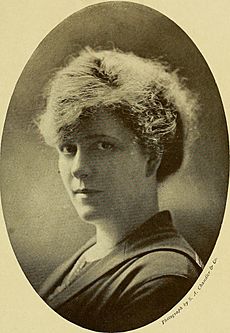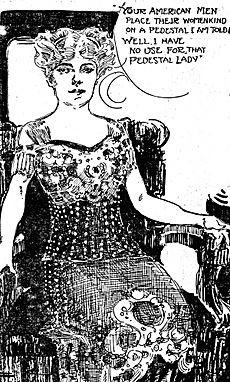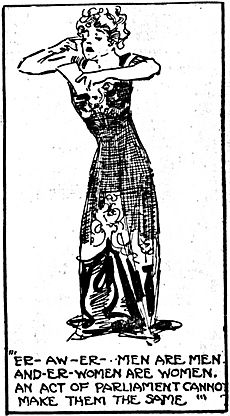Ethel Snowden facts for kids
Ethel Snowden, Viscountess Snowden (born Ethel Annakin; 8 September 1881 – 22 February 1951), was an important British figure. She was a socialist, a champion for human rights, and a feminist politician. She came from a middle-class family. A preacher inspired her to become a Christian Socialist. She first worked to promote temperance (avoiding alcohol) in poor areas of Liverpool.
Ethel joined the Fabian Society and later the Independent Labour Party. She earned money by giving speeches in Britain and other countries. Before World War I, she was a main leader in the fight for women's suffrage (the right for women to vote). Later, she started The Women's Peace Crusade to oppose the war and ask for peace talks. After visiting the Soviet Union, she strongly criticized its system. This made her unpopular with some left-wing groups in Britain.
Ethel married Philip Snowden, a well-known politician from the Labour Party. He later became the Chancellor of the Exchequer, a top government job. In the 1920s, Ethel became more socially prominent, which she enjoyed. She was happy to be a Governor of the BBC and a Director of the Royal Opera House. Even though her husband received a special title (Viscountcy), money became tight. She took the lead in caring for him. After he died, she continued her work for temperance and wrote for newspapers. Ethel was known as a strong public speaker. She would get very excited about a project and work hard for it, sometimes ignoring anything in her way.
Contents
Early Life and Beliefs
Ethel Annakin was the daughter of Richard Annakin, who built houses. Her father also got involved in politics. He later became an Alderman in Harrogate and was the Mayor in 1930–31. People described Ethel as a strong-willed woman who was also very good-looking.
She trained to be a teacher at Edge Hill College in Liverpool. While there, she joined a church led by a radical preacher named Rev. Charles Frederic Aked. After hearing him speak, she became a socialist. She joined Aked's social work in the poor areas of Liverpool, promoting teetotalism (not drinking alcohol). She also became a member of the Fabian Society, a group that wanted to bring about socialist change slowly.
Ethel met her future husband, Philip Snowden, at a Fabian meeting around 1903. Harrogate, where Ethel was from, was a nicer town not focused on factories. It was unusual for someone from her background to be a socialist. She gave her first speech for the Yorkshire Independent Labour Party in September 1903. In 1904, she started teaching at Walverden School in Nelson, Lancashire. This town was close to Philip Snowden's home. She visited him often, but Philip's mother did not like Ethel, thinking she was too proud.
Marriage and Public Speaking
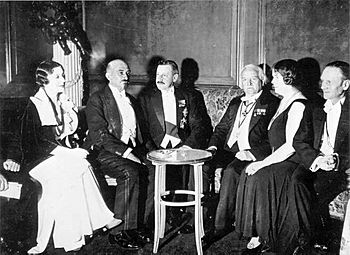
It was often said that Ethel proposed to Philip, which was unusual for the time. They had a quiet wedding with few guests in Otley on 13 March 1905. Philip explained they wanted a simple celebration, not a big political event. It is also thought that both families did not approve. Philip did not even tell his mother until after the wedding. They did not have a honeymoon. Ethel tried to be friends with Philip's mother, but it was always difficult. Philip's mother often criticized Ethel for focusing on her own career instead of caring for Philip, who had long-term health issues.
Ethel and Philip Snowden made their home in Leeds. Ethel began to earn money from her speeches. She was interviewed by a newspaper and said, "Our great motto is liberty, equality of opportunity and fraternity. Our great principle is love." She gave speeches in South Wales about socialism and women's right to vote in 1905. However, she was sick during the 1906 election and could not help Philip win his seat in Blackburn.
In 1907, she had a successful speaking tour in the United States. American audiences seemed to enjoy her style of speaking. During this tour, the Snowdens gave up their home in Leeds and moved to west London.
Fighting for Women's Rights
After 1906, Ethel Snowden became very active in supporting women's suffrage, which means women's right to vote. She was one of the main speakers for the National Union of Women's Suffrage Societies. She believed women should focus on more important things than just fashion or recipes. In 1907, she wrote a book called "The Woman Socialist." In it, she suggested that the government should control marriage. She also thought women should share ownership of household money and mothers should receive a state salary. She even imagined a future where housework was organized together in each street. She said that under socialism, women would not need to wear makeup or dye their hair.
Her strong ideas seemed to influence her husband. Ethel always supported women's right to vote, but she never approved of the violent methods used by some suffragettes.
During a 1910 trip to the United States, Ethel Snowden was interviewed and sketched by Marguerite Martyn for a newspaper. During the interview, Ethel made fun of a politician who was against women's suffrage. She pretended to be him, acting stiffly and clearing her throat. This showed she was a talented mimic and actress.
By 1914, Ethel Snowden was giving speeches at 200 public meetings a year about women's right to vote. She even temporarily left the Independent Labour Party so her political group would not cause problems for her campaign.
Working for Peace
The Snowdens left Britain for a long speaking tour around the world in July 1914. While they were in Canada, news came that World War I had started. Philip Snowden asked if he should return, but he was told not to. This was probably because both he and Ethel were known for their pacifism, meaning they believed war was wrong.
While in Portland, Oregon, Ethel gave an interview that led to a headline saying, "Briton M.P. advises British Soldiers to Shoot Their Officers." Her husband thought this was harmful. Ethel was almost a complete pacifist. In 1916, she joined her husband in campaigning for a peace agreement.
After the 1915 International Alliance of Women meeting, Ethel felt a strong desire to create a British peace organization. In 1917, she became the main organizer and speaker for the Women's Peace Crusade. She believed she had spoken to half a million people in the last year of the war. Her main speech asked men to "love" one another.
Views on Russia
After the war, Ethel Snowden was elected to the National Executive Committee of the Labour Party in the Women's Section. This made her a very important figure in left-wing groups. It also led to a lot of travel to other countries, including Berne and Vienna (to try and restart the Socialist International), Palestine, Georgia, and twice to the United States.
Most notably, she was part of a group sent to Russia in early 1920. This group was from the TUC (Trade Union Congress) and the Labour Party. They went to fairly investigate the Bolshevik Revolution. After she returned, she published a book called Through Bolshevik Russia. This book shared her findings.
Even though she liked Lenin (calling him "the merry-eyed fanatic of the Kremlin"), her overall opinion of the system was very critical. She told a Bolshevik who said a British revolution would start soon, "we want power, but we do not want a revolution." She also noticed that "Everyone I met in Russia outside the Communist Party goes in terror of his liberty or his life." She told a reporter when she returned that "I oppose Bolshevism because it is not Socialism, it is not democracy and it is not Christianity." She compared working conditions there to slavery.
Ethel Snowden's strong criticisms of the Soviets made her unpopular with some left-wing members of the Labour movement. Because of this, she was voted off the National Executive Committee in 1922. Her importance led to invitations to run for Parliament. She refused to run against Lady Astor in Plymouth Devonport, saying that Astor's work was too valuable. She was chosen as a Labour Party candidate for Leicester East at one point. However, she gave up the chance when a special election was called there in Spring 1922.
Life in High Society
Philip Snowden returned to Parliament in 1922. The Labour Party became the official opposition. Lord and Lady Astor arranged a dinner party where King George V and Queen Mary could meet Labour leaders like Snowden and their wives. Ethel became good friends with Queen Mary.
In 1923, the couple used all their earnings and savings to buy a country house called Eden Lodge. It had ten rooms and an acre of land in Tilford in Surrey. Later, signed photographs of the King and Queen were placed above her fireplace at Eden Lodge. They sold their London home and took a flat near Parliament. Ethel was upset when her husband was not given the official living quarters at 11 Downing Street when he became Chancellor of the Exchequer in 1924.
The Snowdens did not usually host many parties because they were both very busy. However, they liked to meet old friends. They enjoyed music, and Ethel was a good pianist.
In 1926, the Conservative Prime Minister Stanley Baldwin appointed Ethel Snowden as a governor of the new British Broadcasting Corporation. She represented women and the Labour Party. This job paid £750 a year. She had disagreements with Sir John Reith, the BBC's first Director-General, throughout her time there. Ethel was given credit for ensuring no alcoholic drinks were served in the new Broadcasting House. She seemed to confirm that this was her doing.
When the Labour government was formed in 1929, the Snowdens finally moved to 11 Downing Street. They found that the cost of employing eight servants and hosting official events meant they had to use their savings. No alcohol was served, but Ethel hosted many tea parties and evening receptions with musicians and artists. She seems to have convinced her husband to give government money to support the Royal Opera House at Covent Garden. She then became a director of the new company that managed it.
Becoming a Viscountess
Philip Snowden became very ill in early 1931. He decided not to run for Parliament again but to join the House of Lords. He confirmed his decision in August, just before the Labour Government collapsed. He did not run in the general election, but he was active in the campaign. When it was announced that he would receive a Viscountcy (a special title), people said that his wife, Ethel, wanted him to have it. Ethel became Viscountess Snowden on 24 November 1931.
After 1931, the Snowdens found their money slowly decreasing. Ethel's five-year job at the BBC ended in late 1931 and was renewed for only one year. After Philip Snowden resigned from his government job over the principle of free trade, that was their only regular income. When her BBC appointment came up again, the Prime Minister did not renew it. The Snowdens had to pay for Eden Lodge, a London flat, and the costs of caring for Philip, who now needed constant medical help. Philip Snowden started writing for newspapers again, often criticizing the Prime Minister.
By 1936, Philip could not move easily and was cared for by Ethel and nurses at Eden Lodge. He still kept up with politics. Ethel attended the Coronation ceremonies on 12 May 1937 without him. Philip died three days later. Ethel had him cremated, and his ashes were scattered on the moor above his birthplace. His books were given to Keighley Public Libraries, forming the 'Viscount Snowden Memorial Library'.
Later Years and Legacy
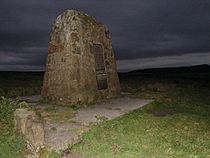
Viscountess Snowden moved to a flat in Dolphin Square. She did not like visiting Eden Lodge, which was used by a government office during World War II. She tried to get her job back as a BBC governor but was unsuccessful. In 1937, she visited the Nuremberg Rally and wrote for a newspaper. She later strongly supported the war against the Nazis, believing them to be evil. However, she had some concerns about bombing large areas. In August 1943, she criticized the BBC for what she saw as poor moral standards. Despite this, she was invited to appear on a popular radio show called The Brains Trust.
Ethel Snowden had a severe stroke in 1947. This left her disabled, and she lived permanently in a nursing home in Wimbledon. However, her mind remained active. Her father died that year at 93, and she died a few months later at 69. Her will was worth £23,279, mostly money she earned early in her career. After cremation, her ashes were scattered on the same moor as her husband's. Her collection of books is now in Silsden library.
There is a student residence hall named Snowden at Edge Hill University in her honor.
Books and Writings
Books
- The Woman Socialist, 1907
- The Feminist Movement, 1913
- Through Bolshevik Russia, 1920
- A Political Pilgrim in Europe, 1920
Pamphlets
- Women:A Few Shrieks, 1907
- Women and the State, 1907
- British Standards of Child Welfare, 1926
- Welfare as Tested by ’The Declaration of Geneva’, 1926
 | Bayard Rustin |
 | Jeannette Carter |
 | Jeremiah A. Brown |


